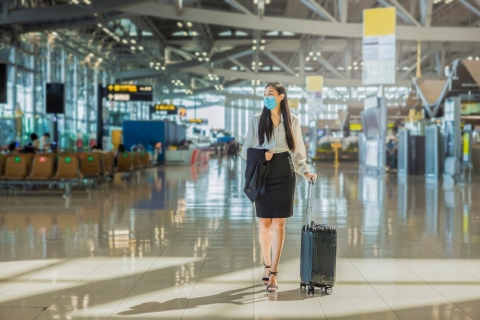Hundreds of Industry Leaders Urge Immediate Action by Congress to Further Drive Recovery

In a bold show of solidarity, more than 600 leaders from the U.S. tourism and events industry united with the U.S. Travel Association to sign a letter to congressional leadership urging swift enactment of federal policies to spur demand for business and international travel and help stabilize the broader travel economy.
Supporters included representatives from destinations, venues and industry organizations in all 50 states, the District of Columbia, Puerto Rico and Guam.
As the COVID-19 pandemic continues to impact the travel industry, providing additional federal relief and stabilizing policies will help all sectors of travel, including events, build an even recovery, according to Tori Emerson Barnes, executive vice president of public affairs for U.S. Travel, which delivered the letter to lawmakers Jan. 19.
“Congress should enact these priorities as quickly as possible to [further] enable the return of business travel and professional meetings and events, in addition to the international inbound travel segment,” she said.
The vast coalition of supporters of the letter are calling on Congress to enact the following measures this year to bolster industry growth, restore lost jobs and reinvigorate businesses and communities:
- Pass the Restoring Brand USA Act, which transfers $250 million in surplus revenue from the Travel Promotion Fund to restore Brand USA’s budget and support its efforts to bring back international visitors to all regions of the U.S. (Brand USA’s budget reached historic lows in 2021 due to the steep decline in international travel fees that are used to fund the program, according to U.S. Travel.)
- Provide targeted tax stimulus to restore spending on business travel, live entertainment and in-person events. Temporary tax credits and deductions, such as those proposed in Sections 2 and 4 of the Hospitality and Commerce Jobs Recovery Act would stimulate spending and quicken the pace of recovery for business travel, conferences, trade shows, live entertainment, the arts, minor league sports and other in-person events.
- Provide additional funding for relief grants to severely impacted travel businesses by expanding eligibility for the Restaurant Revitalization Fund (RRF) and the Shuttered Venue Operators Grant Program or enacting a new relief program with a similar structure to RRF for travel-dependent businesses severely impaired by COVID-19 restrictions, including hotels, event organizers, group tour operators, venues, attractions, travel advisors and many others.
The letter also provides a link to other policies being advocated by U.S. Travel, including the enactment of government-sponsored event cancellation insurance coverage for pandemic-related losses, such as the proposed Pandemic Risk Insurance Act of 2021 (PRIA). After first proposing a version of the act in March 2020, U.S. Representative Carolyn B. Maloney (D-NY) reintroduced PRIA in Congress last November, prompting overwhelming industry support.
If passed, the bill would require insurance companies to offer business interruption and event cancellation policies that cover pandemics as well as create a Pandemic Risk Reinsurance Program to ensure that there is sufficient capacity to cover the losses and protect the economy in the event of a resurgence of COVID-19 or future pandemics.
The devastating impact the pandemic has had on the travel industry overall is spelled out in the letter, including a $730 billion loss in spending since March 2020, as well as projections from Tourism Economics, which indicate that without targeted federal policies to accelerate the return of business and international inbound travel demand, both vital segments will not fully recover to 2019 levels until at least 2024. Tourism Economics reports show that domestic business travel spending was 50% below 2019 levels in 2021 and could be 24% below 2019 levels in 2022.
According to David DuBois, president and CEO of the International Association of Exhibitions and Events (IAEE) and co-president of the Exhibitions and Conferences Alliance, the travel industry and the exhibitions and events industry saw improvement in activity in 2021 but would like to be closer to its goal of reaching pre-pandemic performance levels of 2019.
"Given the continued uncertainty surrounding how Omicron and subsequent variants of COVID-19 will affect our industries, we are still in great need of support from Congress as we continue our recovery process," he said. "We are eager to not only get our industry back on track, but to get back to contributing to the overall U.S. economy to our fullest potential."
DuBois added that in 2019, business-to-business events drew 33.2 million attendees and contributed $101 billion to the overall U.S. economy through job creation and spending dollars that benefit the cities and venues that host the events.
"By taking the measures proposed in the appeal put forth by U.S. Travel and its supporting organizations, the best-case scenario is that our industry receives the assistance we need to continue doing everything we can on our end to successfully reach our recovery goals," he said. "IAEE will continue to work with its industry partners to advocate for the support we need to help our industries get to where we need to be."
Don Welsh, president and CEO of Destinations International, echoed the sentiments of DuBois, saying that as we enter the third year of the pandemic, it’s more important than ever that Congress acts to support the travel industry—including the business events industry, which has been among the hardest-hit sectors throughout the pandemic.
"We remain guardedly optimistic about the strong return of business events this year and know that meetings and events can take place safety thanks to protocols and safety measures being put in place," he said. "Restoring the international inbound market is crucial for the recovery of the country’s visitor economy, so we enthusiastically support these efforts to fund Brand USA and its mission of promoting the country abroad."
Don’t miss any event-related news: Sign up for our weekly e-newsletter HERE and engage with us on Twitter, Facebook and LinkedIn!


Add new comment